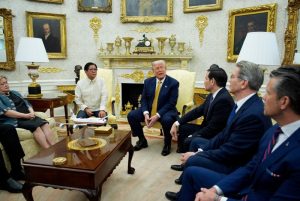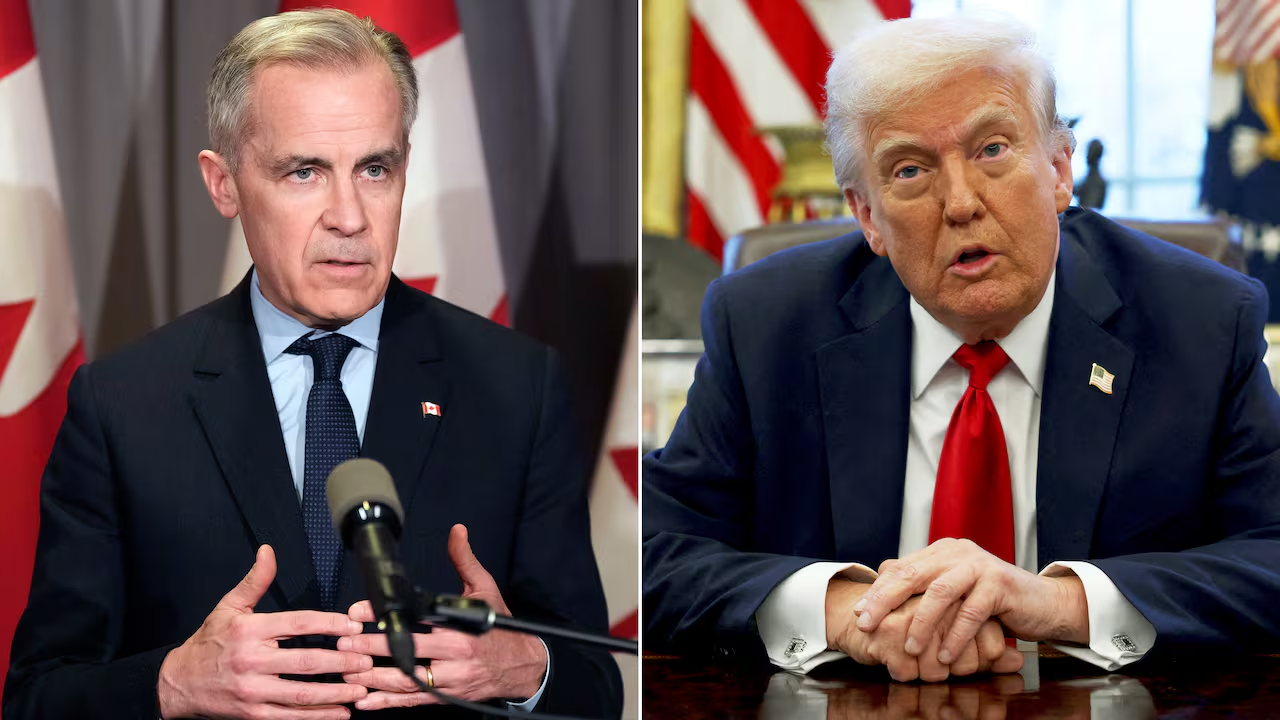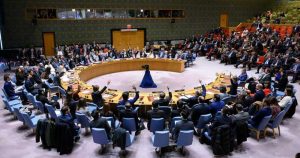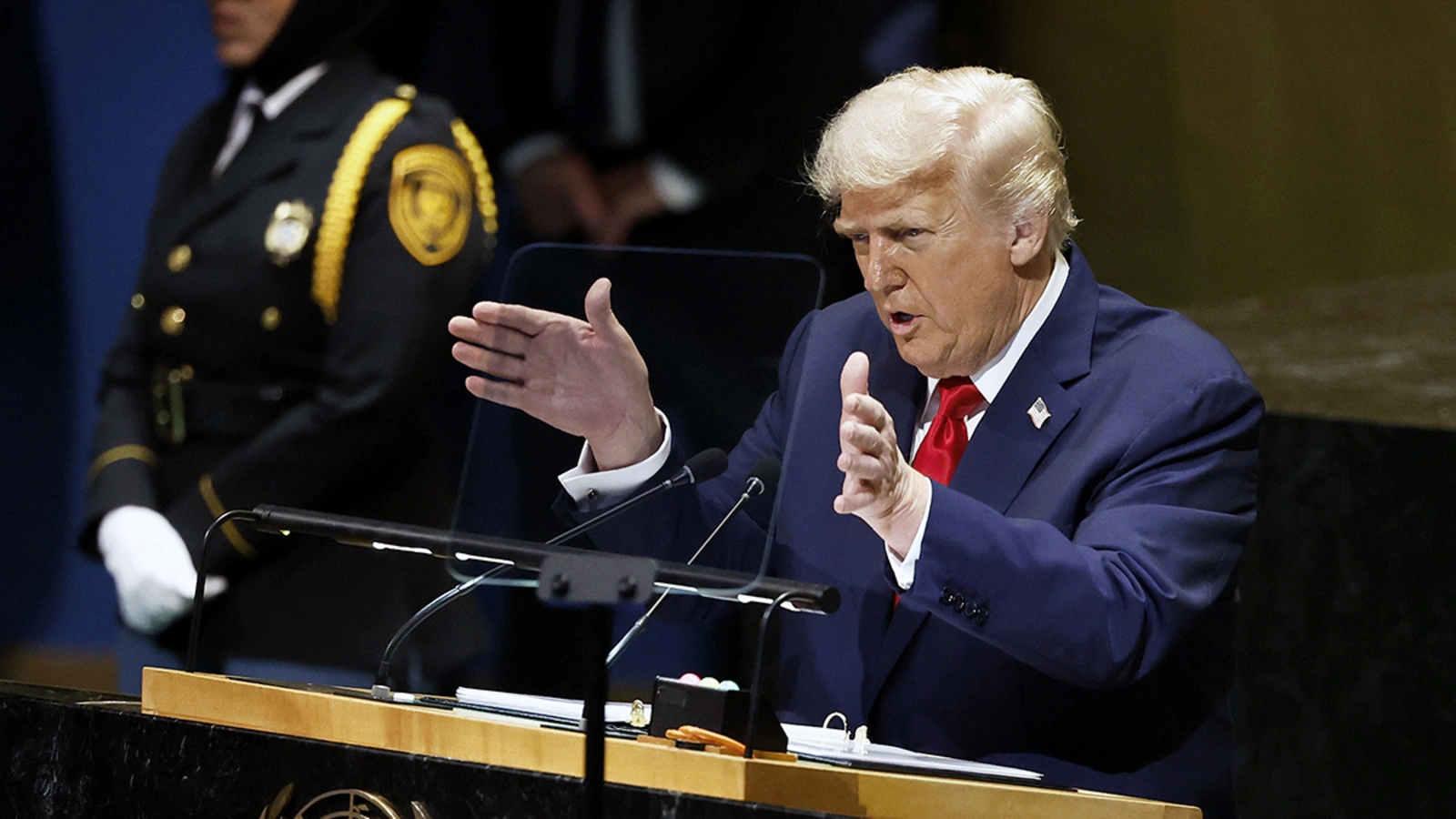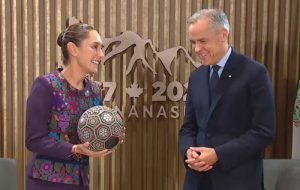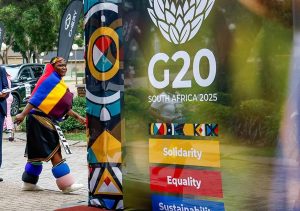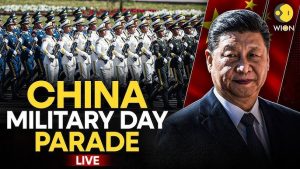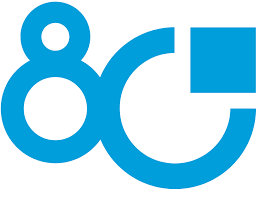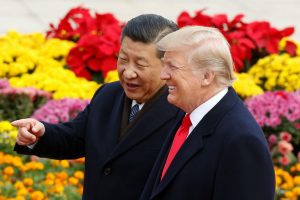
The announcements by President Trump before and after meeting China’s President was just so classic. Before meeting President Xi – just ninety minutes before joining him – Trump suddenly declares the resumption of nuclear testing, kinda. As described by Katie Rogers and Erica L. Green of the NYTimes, Trump announced on his Social Media:
“Because of other countries testing programs, I have instructed the Department of War to start testing our Nuclear Weapons on an equal basis,” he wrote, saying the process would begin immediately.”
Problem – there has been no nuclear testing by either Russia or China, the two main nuclear competitors, since 2017 though both have tested new nuclear delivery systems. It might well be that this was what Trump was referring to. Secondly, this announcement occurred just before a meeting with China. So, why such an announcement before meeting with Xi Jinping. As the two journalists suggested:
“But the chaotic backdrop to the meeting was a reminder of how Mr. Trump’s approach to issues and diplomacy can change on a dime — even on a matter as vital as the strategy governing the American nuclear arsenal — and also displayed his increasingly volatile approach to foreign policy since he retook office.”
As noted by Steven Borowiec, CK Tan and Mitsuru Obe at Nikkei Asia:
“Last weekend in Kuala Lumpur, negotiators for the rival powers [US-China] hammered out a “framework” of an agreement for the two leaders to discuss and consider finalizing, according to U.S. Treasury Secretary Scott Bessent. China was more circumspect, calling it a “preliminary consensus.””
Trump did, it appears, gain from these bilateral US-China discussions : the suspension of export controls by China on rare earth minerals for a year, apparently, though not clearly yet, the sale of Tik Tok in the US by China though not directly mentioned by China. Yet, the conclusion of the meeting by Trump was seen by many as a win for Xi. Examining the results, this is how NYTimes’, Lily Kuo and David Pierson viewed it:
“When Xi Jinping walked out of his meeting with President Trump on Thursday, he projected the confidence of a powerful leader who could make Washington blink.”
“The outcome of the talks suggested that he succeeded.”
“By flexing China’s near monopoly on rare earths and its purchasing power over U.S. soybeans, Mr. Xi won key concessions from Washington — a reduction in tariffs, a suspension of port fees on Chinese ships and the delay of U.S. export controls that would have barred more Chinese firms from access to American technology. Both sides also agreed to extend a truce struck earlier this year to limit tariffs.”
So now we will just have to await, presumably, the concluded agreement. But it does cause one to develop a giant headache while trying to uncover the diplomatic and strategic logic exercised by President Trump when it comes to China and indeed with his allies and near allies in the Indo-Pacific, assuming there is such a thing .
““It’s a personalized style of diplomacy that plays well to both leaders’ instincts,” said Lizzi C. Lee, a fellow focusing on the Chinese economy at the Asia Society Policy Institute. “For now, these gestures of good will seem to set the tone for a period of managed stability.””
In summary, according to Alexandra Sharp at FP, the US and China agreed to:
“… a one-year pause on further trade hostilities, addressing a 90-day tariff suspension that was set to expire next month. As part of the deal, Trump backed down on his threat from just two weeks ago to raise tariffs by an additional 100 percent and instead halved Washington’s 20 percent fentanyl-linked levy, bringing down total U.S. duties on most Chinese goods from 57 percent to 47 percent.”
“In exchange, Xi agreed to suspend rare-earth export controls announced on Oct. 9 for at least one year. China dominates global rare-earth supply chains, controlling around 85 percent of processing and 92 percent of magnet production, which are crucial to the U.S. military, semiconductor, and auto industries. However, as FP’s Rishi Iyengar, Keith Johnson, and Christina Lu report, the statement from China’s Ministry of Commerce about the agreement “did not address other critical mineral export controls that Beijing had issued prior to October—including ones on gallium and germanium, which are essential to semiconductors—and China still requires firms to secure export licenses for certain rare earths and magnets.””
“China also agreed to resume buying American soybeans. Beijing was once the biggest foreign buyer of U.S. soybeans, but after Trump ignited his second-term trade war, Xi effectively froze all new orders—severely hurting American farmers. What Thursday’s deal has done is “highlighted for Beijing that this is a political pressure point that it can keep squeezing the United States on when it wants something done,””
“Alongside rare earths and soybean sales, the trade framework outlines that China will begin purchasing U.S. liquified natural gas, particularly from Alaska, and both sides will suspend port fees that they imposed on each other earlier this month. Still, Iyengar, Johnson, and Lu note that “since U.S.-flagged cargo ships barely ply the seas and don’t much unload in Chinese ports, that was not a big concession on Beijing’s part.””
The conclusions drawn from this very active diplomatic activity by the President and his Chinese counterpart are varied and contradictory.
Many suggest that what the two have achieved is a truce. The rivalry and competition remains as strong as ever between the US and China but for the moment the two geopolitical rivals have stepped back. As Ana Swanson, who writes about trade and international economics for NYTimes suggests:
“Rather than advancing the U.S.-China relationship, the concessions that President Trump and President Xi Jinping of China agreed to in their meeting in South Korea on Wednesday appear to have largely rolled back the clock, returning to the terms of an earlier truce.”
Now on the negative side of the ledger she suggests that by suspending additions to the entity list Trump had for the first time put a national security issue into negotiation:
“But one of the reversals from the United States was more notable in the precedent it set. The Trump administration agreed to pause for one year a rule that expanded the number of Chinese companies restricted from access to advanced technology. The rule, issued just four weeks ago, extended the reach of the “entity list,” a kind of trade blacklist for foreign companies that pose a national security threat.”
“Former officials and analysts said Thursday that the move appeared to be one of the first concessions the United States had made on national security-related technology controls as part of a trade negotiation. They called it a potential breakthrough for the Chinese side, which has long pushed to negotiate with the United States over these types of measures, known as export controls.”
Yes, possibly, but I suspect it could just as easily be reversed. It is apparent that there is no consistency here in Trump 2.0. As described by Gideon Rachman in the FT in an article titled, “The Trump doctrine: don’t rely on America”:
“Trump’s tantrums and sudden changes of direction can make his foreign policy seem bewilderingly unpredictable. But there are some clear themes that have emerged over the past nine months.”
“The president has certain unwavering obsessions. He loves tariffs — believing that they will make America richer and more powerful. He is also convinced that the US has been “ripped off” by its allies and is determined to remake the international system to align with his “America First” policy.”
“Trump’s approach to world affairs is deeply transactional. Talk about American values and freedom — beloved of former presidents — has been dropped. Instead, Trump likes to talk about American strength and to pocket “wins”. Those victories could be the promise of huge investments into the US. Or they could be another peace settlement that he can take credit for.”
Intentionally, or not, I think Gideon has provided as sharp a view of Trump actions that is possible: it is transactional, driven by tariff initiatives and determined to pocket wins, which of course leads the other side to ‘stroke’ this Presidential ego.
Now I am not suggesting that Xi Jinping approaches bilateral relations with Trump in any manner that resembles this. Indeed I think Nicholas Kistof ‘hit the mark’ best in his recent piece, “Trump Lost to China” in the NYTimes:
“After the United States-China summit planned for Thursday, President Trump may crow about his deal-making skill. Aides may suggest that he deserves a Nobel Prize for negotiation — but I invite you to roll your eyes.”
“The most important bilateral relationship in the world today is between the United States and China, and Trump has bungled it. He started a trade war that Washington has been losing, and if a truce is formalized this week, it will likely be one with China holding power over America and leaving our influence diminished.”
Finally, I think the trip underscored, however, Trump’s indifference to multilateral diplomacy and action. While Trump did attend ASEAN he left before the meeting of the much larger multilateral gathering – APEC (Asia-Pacific Economic Cooperation). But one notable attendant was there, as pointed out by James Griffiths, the Asia correspondent for the Canadian, Globe and Mail:
“Hours after he left South Korea, however, many of the same world leaders clamouring for a meeting with Mr. Trump – including Prime Minister Mark Carney and new Japanese Prime Minister Sanae Takaichi – were turning their attention to Chinese President Xi Jinping, whose presence dominated the Asia-Pacific Economic Cooperation summit, which began Friday in the South Korean city of Gyeongju and runs into the weekend.”
Griffiths further notes the Indo-Pacific centrality of this yearly summit gathering:
“A non-binding 21-member forum, APEC accounts for roughly 50 per cent of global trade and 61 per cent of GDP, with the U.S. and China by far the biggest member economies.”
Nevertheless, notwithstanding this very personalist Trump style diplomacy it appears that Xi Jinping and his colleagues believe that they have solved the puzzle of this personalist style. As described by Lingling Wei at the WSJ:
“But there is more to the agreement than just a temporary cease-fire. It is the first plank in a newly structured, high-level dialogue, intended to lock in a full year of leader-led diplomacy. The schedule is ambitious: Trump is expected to travel to Beijing early next year followed by a reciprocal visit from Xi later that year.”
“For Trump, it is a stunning reversal.”
“The first Trump presidency put the U.S. and China on a pathway toward long-term, unquestionable competition, if not confrontation,” said Evan Medeiros, a former senior national-security official in the Obama administration and now a professor at Georgetown University. “Now it appears that Trump is flipping his own script on China, initiating a new phase of more and higher-level engagement.””
“Beyond high-level diplomacy, the truce sets the stage for a tactical stabilization of the relationship over the next year.”
“This detente pivots Trump back to his preferred role as the central dealmaker, securing short-term economic relief—like resumed soybean purchases—that plays well with Republican voting states.” …
“The thinking in Beijing’s policymaking circles, according to people who consult with Chinese officials, is that Xi is approaching his near-term objective: a “strategic stalemate”—an enduring equilibrium where American pressure becomes manageable and China buys time to catch up to the U.S.”
For me the immediate ‘bottom line’ I draw from current action is that it is not possible to construct a clear diplomatic and strategic set of Trump policy objectives. Instead actions need to be evaluated in their immediate setting and consequences. One can draw immediate tactical results; that’s kinda it.
Credit Image: East Asia Forum (EAF)
This Post originally appeared at my Substack Alan’s Newsletter – https://globalsummitryproject.substack.com/p/summits-a-la-trump-20

